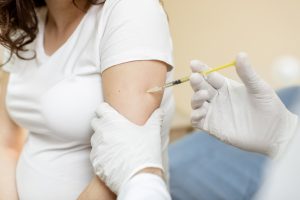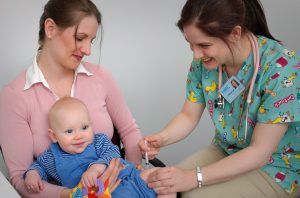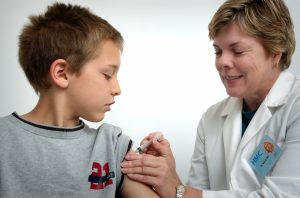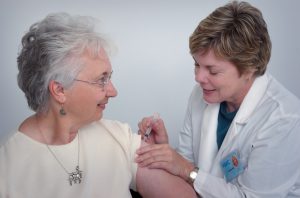Medical Feature: Vax Facts
What local experts advise on vaccinations
To view as a PDF, click here.

This August we’re taking a closer look at vaccinations — all types and for all ages. While Covid-19 vaccinations have been in the news often in the past years, there are many more life-saving immunizations that everyone needs to keep current as well.
For this feature, we checked in with Dr. Lori Handy at Children’s Hospital of Philadelphia for her recommendation to give the Covid-19 vaccine to young kids (from 6 months to 5 years). Dr. Diana Kudes of Suburban Hospital reminds parents that kids of all ages need other vaccinations as they return to school, daycare and playgrounds, where diseases can easily spread. And parents need to remember to stay current on important vaccinations as part of a lifelong process, according to Dr. Raida Rabah of Chester County Hospital. Finally, Dr. Raymond Carter of ChristianaCare urges seniors to get necessary vaccinations — they have nothing to lose and everything to gain.
We hope you find something helpful in these pages. And here’s to your health!
Covid Vaccination for Young Kids
The CDC’s latest guidance extends to children as young as 6 months
Lori Handy, MD, MSCE, Children’s Hospital of Philadelphia
 On June 18, 2022, the Centers for Disease Control and Prevention (CDC) endorsed a recommendation for Covid-19 vaccination for children as young as 6 months of age, making about 20 million children across the country newly eligible. Many parents with young children have been eagerly awaiting this milestone in the pandemic since the CDC’s October 2021 recommendation covering children 5 to 11.
On June 18, 2022, the Centers for Disease Control and Prevention (CDC) endorsed a recommendation for Covid-19 vaccination for children as young as 6 months of age, making about 20 million children across the country newly eligible. Many parents with young children have been eagerly awaiting this milestone in the pandemic since the CDC’s October 2021 recommendation covering children 5 to 11.
Some families, though, are more reluctant to move ahead with vaccinating their young children, so it’s essential to understand why these vaccines are important and how they have been studied so parents can make the best decision for their children.
Logistics
Two vaccines are available for this new, younger age group. Both vaccines have been provided Emergency Use Authorization (EUA) from the U.S. Food and Drug Administration (FDA).
The Moderna vaccine is an mRNA vaccine. Each dose contains a quarter of the amount of vaccine as the adult dose and is given in two doses, 28 days apart.
The Pfizer vaccine is also an mRNA vaccine. Each dose of this vaccine contains one tenth the amount of medication as they adult dose and is given in three doses. After the first dose is given, the second dose is given three weeks later, and the third dose is given at least eight weeks after that.
Children will be considered fully vaccination two weeks after completing either series of vaccines — either the two-dose Moderna series or the three-dose Pfizer series.
It is currently unknown if a booster will be recommended for either series of immunizations.
Effectiveness
Both vaccines had predefined outcomes that they needed to meet to determine whether they were effective. The studies were done looking at something called “immunobridging” – essentially, ensuring that the participants had an immune response equal to or more robust than teenagers and young adults.
 Lori Handy, MD, MSCE, is Medical Director of Infection Prevention and Control and an attending physician in the Division of Infectious Diseases at Children’s Hospital of Philadelphia. She is also an Assistant Professor of Clinical Pediatrics at the University of Pennsylvania Perelman School of Medicine. CHOP.edu.
Lori Handy, MD, MSCE, is Medical Director of Infection Prevention and Control and an attending physician in the Division of Infectious Diseases at Children’s Hospital of Philadelphia. She is also an Assistant Professor of Clinical Pediatrics at the University of Pennsylvania Perelman School of Medicine. CHOP.edu.
Vaccines Are Vital for Healthy Kids
Kids are returning to school and playgrounds. So are childhood diseases.
Diane Kudes, MD, Suburban Hospital
 Pediatric immunizations have changed the world! Parents used to live in fear of their child getting common diseases that could kill, blind, disfigure or disable their child. Even for kids who were not severely affected, these diseases still cost lots of missed school, medical bills and missed work for parents.
Pediatric immunizations have changed the world! Parents used to live in fear of their child getting common diseases that could kill, blind, disfigure or disable their child. Even for kids who were not severely affected, these diseases still cost lots of missed school, medical bills and missed work for parents.
Thanks to some amazing vaccines, most of these illnesses have become rare in our country.
Importance of Vaccines
Some parents were afraid to bring their child to the doctor’s office for routine visits early on during the Covid pandemic. That was understandable then. But this delay put many children behind in getting all their needed vaccinations.
As children return to their usual activities, common illnesses have also quickly returned. Those common childhood illnesses that are preventable with vaccines will also now increase if we don’t improve current immunization rates.
The diseases that we immunize against are still out there and will spread if children are not protected. Some parents I talk to don’t think children are at risk of getting these diseases because they believe the diseases don’t happen in our country.
While infections from illnesses like measles are uncommon in the U.S., they do happen. In the past few years, I’ve diagnosed children in my practice with pertussis (whooping cough), varicella (chicken pox) and mumps — all of which have highly effective vaccines.
Measles – A Cautionary Tale
Vaccines can be highly effective, but none offer 100% protection. It’s important that the majority of children be immunized to prevent spread to those who are not or cannot be immunized (for example, because they have an illness such as leukemia).
For highly contagious diseases, like measles, we need at least 95% of people vaccinated to prevent an outbreak — for so-called herd immunity. Unfortunately, there have been measles outbreaks in the U.S. in communities with low immunization rates. According to the CDC, we had 704 cases of measles in 2019 — that’s before the pandemic — which was the highest number since 1994. And almost all those cases were in unvaccinated people.
 Dr. Kudes is a board-certified pediatrician who’s practiced at Suburban Family Medicine for 15 years. She completed her medical education at Temple University and her residency at Golisano Children’s Hospital. She’s part of the teaching faculty at the Suburban Family Medicine Residency program, clinical assistant professor in the Department of Pediatrics at PCOM and a member of the PA American Academy of Pediatrics School Health Committee. SuburbanHosp.org.
Dr. Kudes is a board-certified pediatrician who’s practiced at Suburban Family Medicine for 15 years. She completed her medical education at Temple University and her residency at Golisano Children’s Hospital. She’s part of the teaching faculty at the Suburban Family Medicine Residency program, clinical assistant professor in the Department of Pediatrics at PCOM and a member of the PA American Academy of Pediatrics School Health Committee. SuburbanHosp.org.
Remember to Get Your Shots: It’s a Lifelong Process
Covid isn’t all you should be vaccinated against
Raida M. Rabah, MD, infectious disease specialist at Penn Medicine Chester County Hospital

Vaccinations have dominated the headlines since the start of the Covid pandemic more than two years ago. However, we’ve benefited from immunization since healthcare officials in the United States recommended the first batch of “routine” vaccines in the late 1940s. Over the nearly 75 years since, billions of lives have been saved by vaccines.
And yet, for all the good they’ve done and continue to do, vaccinations are often mistakenly thought to be something limited to our childhood. While some vaccines are administered strictly during infancy and childhood, most need to be updated throughout our lives.
Reasons for Vaccinations
Ensuring we’re staying up to date with the recommended vaccines is important for several reasons. For one, the ease of travel these days has opened us up to literally a world of viruses we previously had little or no exposure to. For another, as we age, our immune response to previous vaccines gradually wanes. Vaccines are also constantly evolving, with newer, more effective versions becoming available regularly.
But perhaps the most critical reason is that we’re not living alone in the world. Being fully vaccinated best protects not only you but everyone you interact with and everyone they interact with. This includes children who aren’t yet old enough to be vaccinated and immunocompromised people who are susceptible to getting sick regardless of their vaccination status.
Recommended Vaccines for Adults
What follows is a brief but comprehensive rundown of current recommended vaccines. For the sake of simplicity, the guidance is for healthy adults. If you’re at greater risk than most for a certain condition, or you’d simply like to learn more about these vaccines, including their potential side effects, visit the Centers for Disease Control and Prevention’s (CDC) website, CDC.gov, and search “Adult Immunization Schedule.”
 Raida M. Rabah, MD, is an infectious diseases specialist at Penn Medicine Chester County Hospital. Board certified in internal medicine and infectious diseases, Dr. Rabah completed a residency in internal medicine and a fellowship in infectious diseases at Wayne State University in Detroit. She’s been practicing in Chester County since 1994, the last 20 years with Brandywine Valley Infectious Disease Associates in Coatesville. ChesterCountyHospital.org.
Raida M. Rabah, MD, is an infectious diseases specialist at Penn Medicine Chester County Hospital. Board certified in internal medicine and infectious diseases, Dr. Rabah completed a residency in internal medicine and a fellowship in infectious diseases at Wayne State University in Detroit. She’s been practicing in Chester County since 1994, the last 20 years with Brandywine Valley Infectious Disease Associates in Coatesville. ChesterCountyHospital.org.
Seniors Should Get Vaccinated
You’ve got nothing to lose and everything to gain.
Raymond Carter, MD, clinical leader of the primary care practice at ChristianaCare’s Concord Health Center in Chadds Ford
 Some things that are healthy are also pesky. A staircase for instance. It’s less convenient than taking an elevator — but it’s far better for your cardiovascular system. Or a salad. Not always as satisfying as a hamburger, but much richer in nutrition.
Some things that are healthy are also pesky. A staircase for instance. It’s less convenient than taking an elevator — but it’s far better for your cardiovascular system. Or a salad. Not always as satisfying as a hamburger, but much richer in nutrition.
Vaccines can also be pesky, not to mention prickly. But they are essential for your health.
When you’re born in the United States, during the first few years of your life, you receive many childhood vaccines to build additional immunity. That’s why we’ve largely eradicated diseases such as measles, mumps, smallpox and more in the U.S.
I say “largely” because not all of these diseases are completely eliminated from our communities. And that’s also why it’s important for you to stay up to date with vaccinations that can protect you and your loved ones.
Covid-19 Vaccine and Boosters
Stay protected. Getting vaccinated and boosted against Covid-19 is the best defense against this virus. It will also help protect others around you from getting the virus, including people who are more likely to get very sick or die from Covid-19. Second boosters are now strongly recommended for all persons 50 and above.
Worth knowing: Getting vaccinated and boosted with this safe, highly effective vaccine can reduce your risk of getting Covid-19 and prevent you from getting severe or life-threatening symptoms even if you do get this virus.
When to get it: As soon as possible.
Flu Vaccine
Get it even if you are healthy. Plus, it’s free! Even if you’re in tip-top shape in your senior years, you should still get the flu vaccine each year. Since age is an independent risk factor for severe consequences from the flu, you’re more vulnerable than a 20-something couch potato.
 Raymond Carter, MD, is board certified in both Internal Medicine and Pediatrics and is a member of the American College of Physicians and the American Academy of Pediatrics. He’s made presentations concerning healthcare costs, quality and safety systems, childhood and adult vaccinations, and advanced transition care concepts. Dr. Carter is a clinical leader of the primary care practice at ChristianaCare’s Concord Health Center in Chadds Ford, where he sees patients of all ages. ChristianaCare.org.
Raymond Carter, MD, is board certified in both Internal Medicine and Pediatrics and is a member of the American College of Physicians and the American Academy of Pediatrics. He’s made presentations concerning healthcare costs, quality and safety systems, childhood and adult vaccinations, and advanced transition care concepts. Dr. Carter is a clinical leader of the primary care practice at ChristianaCare’s Concord Health Center in Chadds Ford, where he sees patients of all ages. ChristianaCare.org.
